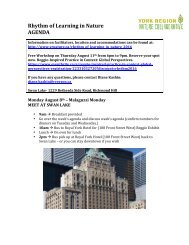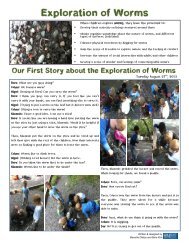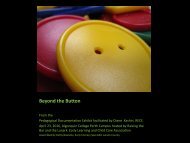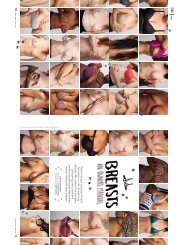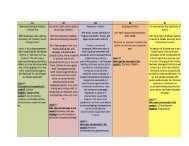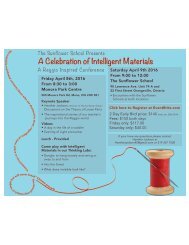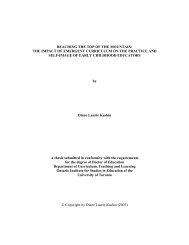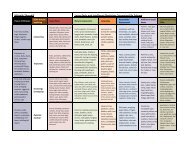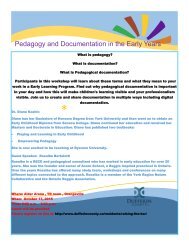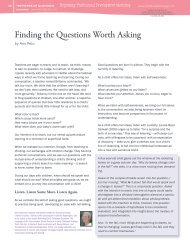Early Childhood Education Program Standard
Create successful ePaper yourself
Turn your PDF publications into a flip-book with our unique Google optimized e-Paper software.
II. Vocational <strong>Standard</strong><br />
All graduates of <strong>Early</strong> <strong>Childhood</strong> <strong>Education</strong> programs have achieved the ten vocational<br />
learning outcomes (VLOs) listed in the following pages, in addition to achieving the<br />
essential employability skills (EES) learning outcomes and meeting the general<br />
education (GE) requirement. Graduates of Native or Aboriginal <strong>Early</strong> <strong>Childhood</strong><br />
<strong>Education</strong> programs (MTCU Code 51211) have achieved outcomes one to ten and an<br />
additional outcome eleven specific to Aboriginal <strong>Early</strong> <strong>Childhood</strong> <strong>Education</strong> programs.<br />
Preamble<br />
The <strong>Early</strong> <strong>Childhood</strong> <strong>Education</strong> program prepares graduates to work with infants,<br />
toddlers, preschool and school-aged children* and their families* in a variety of early<br />
learning settings including childcare centres, community child and family* support<br />
centres, home-based child care, Full Day <strong>Early</strong> Learning Kindergarten programs, school<br />
readiness and early intervention programs.<br />
Graduates create safe, healthy and inclusive* early learning environments* that support<br />
equitable and accessible learning opportunities for children* with diverse abilities,<br />
interests and ideas, and their families*. <strong>Early</strong> childhood educators work collaboratively<br />
with colleagues, children* and families* from diverse* cultures*, experiences and<br />
backgrounds. <strong>Early</strong> childhood educators form partnerships with families*, and support<br />
their parenting through ongoing communication, guidance and education. Graduates<br />
form collaborative relationships with professionals from other disciplines to support<br />
holistic development* of all children*.<br />
<strong>Early</strong> childhood educators establish responsive relationships* with children* and<br />
families* to support the optimal development* and learning of all children*. In addition,<br />
early childhood educators acknowledge that there is variability among children* and<br />
recognize potential areas that may require referral for further assessment and/or<br />
intervention.<br />
Graduates design and implement quality play-based* early learning curriculum* and<br />
programs that support the learning needs of individuals and groups of children*, as well<br />
as their families*. <strong>Early</strong> childhood educators capitalize on spontaneous events in order<br />
to support child-initiated learning and to promote learning that arouses curiosity and<br />
imagination. Graduates evaluate and revise curriculum* based on regular observations<br />
and analysis of children’s* development* and their responses to the curriculum* and<br />
goals of the program.<br />
Graduates have knowledge of current legislation related to early learning environments*<br />
and recognize the interconnection of governing legislation, code of ethics, professional<br />
practice standards, and administrative responsibilities in order to provide support and<br />
guidance to children* and their families*.<br />
Along with other early learning professionals and community partners, early childhood<br />
<strong>Early</strong> <strong>Childhood</strong> <strong>Education</strong> <strong>Program</strong> <strong>Standard</strong> 4




